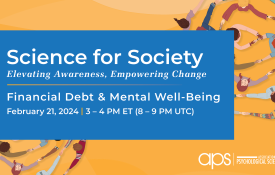-
We Still Don’t Believe How Much Things Cost
Deodorant was what changed Rob Cooper’s mind about the economy. After paying under $4 for his signature Old Spice Stronger Swagger for a decade, the 49-year-old was shocked last year to see it priced at
-

Spending, Saving, and Owing: How Finances Intersect with Behavior and Emotions
In a February Science for Society webinar, a panel of experts discussed the impact of financial debt on psychological well-being, the link between spending habits and happiness, and much more.
-
For Gen Z, an Age-Old Question: Who Pays for Dates?
During a recent dinner at a cozy bar in Upper Manhattan, I was confronted with an age-old question about gender norms. Over bowls of ramen and sips of gin cocktails, my date and I got
-
As Prices Increase During a Recession, Mental Health Usually Decreases
In periods of economic recession, negative mental health symptoms like depression, anxiety, panic attacks, and self-harm tend to increase, according to a study in Behavioral Sciences. Adverse changes in the labor market create wage cuts and layoffs.
-
How Money Helps to Build Brain Power
We know that children who grow up poor are much more at risk for problems later on, from mental and physical health issues to lower education levels and less income as adults. It’s one of
-
Science Says Flipping This Mindset Switch Will Help You Save Money, Starting Today
If you want to save money to start a business, you’re in good company. The majority of small businesses are funded through savings; one out of three small businesses launched with less than $5,000 in startup capital. Hoping to

